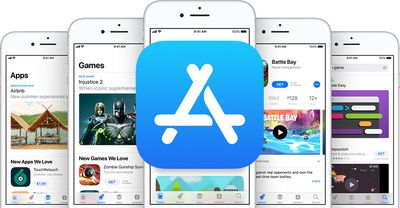Apple recently adjusted its App Store search algorithm so that fewer of its own apps appear at the top of search results, senior executives Phil Schiller and Eddy Cue confirmed in an interview with The New York Times.

Specifically, the executives said Apple has tweaked a feature that sometimes grouped apps by maker so Apple apps would no longer look as if they were receiving preferential treatment. The New York Times claims that many Apple apps have dropped in the search results since the change was implemented in July.
Schiller and Cue both denied any wrongdoing on Apple's part, however, describing the change as an improvement rather than a fix:
On July 12, many Apple apps dropped sharply in the rankings of popular searches. The top results for "TV" went from four Apple apps to two. "Video" and "maps" changed from three top Apple apps to one. And Apple Wallet dropped from the No. 1 spot for "money" and "credit."
Mr. Schiller and Mr. Cue said the algorithm had been working properly. They simply decided to handicap themselves to help other developers.
"We make mistakes all the time," Mr. Cue said.
"We're happy to admit when we do," Mr. Schiller said. "This wasn't a mistake."
Even after the change, analytics firm Sensor Tower found Apple apps ranked first in the App Store for over 700 search terms, even when the Apple apps were less relevant and less popular than ones from its competitors:
On Aug. 21, Apple apps ranked first in 735 of roughly 60,000 search terms tracked by Sensor Tower. Most of the tracked searches were obscure, but Apple’s apps ranked first for many of the popular queries. For instance, for most of June and July, Apple apps were the top result for these search terms: books, music, news, magazines, podcasts, video, TV, movies, sports, card, gift, money, credit, debit, fitness, people, friends, time, notes, docs, files, cloud, storage, message, home, store, mail, maps, traffic, stocks and weather.
A spokesperson for Apple said the company could not verify the data because it did not keep a record of historical search results, according to The New York Times. Apple's algorithm is said to examine 42 different signals, including an app's relevance to a given search, its ratings, and its popularity based on downloads and views.
The New York Times shared a particularly compelling example related to Apple's Wallet app following the Apple Card's introduction, but Schiller and Cue denied any intentional manipulation of the App Store search results:
On March 25, the company unveiled an Apple-branded credit card that can be used via the Apple Wallet app. The next day, Apple Wallet was the No. 1 result in searches for "money," "credit" and "debit." The app had not ranked for those search terms before then.
Mr. Cue and other Apple executives speculated that the team marketing the Apple Wallet app had added "money," "credit" and "debit" to the underlying description of the app, causing it to appear for those search results.
Then people searched those terms, found the Apple Wallet app and clicked on it, telling the algorithm that it should be the first result.
"We can just tell you that we've not done anything to drive that — that is, other than launching a great wallet, an Apple Card and marketing the heck out of it," Mr. Schiller said.
Apple has faced increasing scrutiny as of late over the way it runs its App Store, ranging from Spotify's anticompetitive complaint in Europe to a class action lawsuit accusing Apple of operating an App Store monopoly in the United States, which the Supreme Court has allowed to proceed.
Apple recently defended its practices, noting that the App Store "welcomes competition" and was created to be "a safe and trusted place for customers to discover and download apps" and "a great business opportunity for all developers."



















